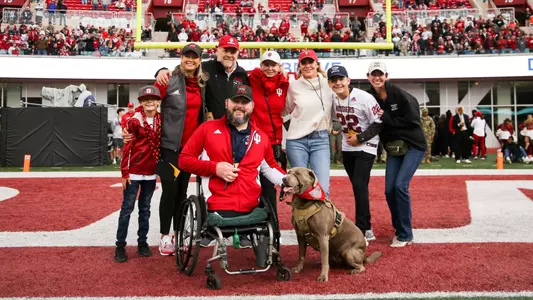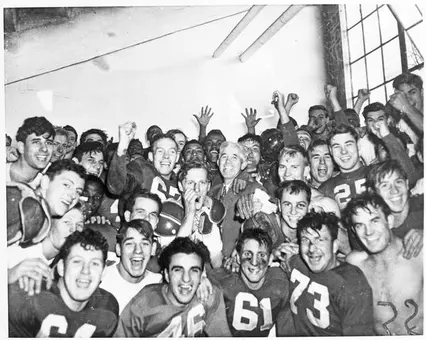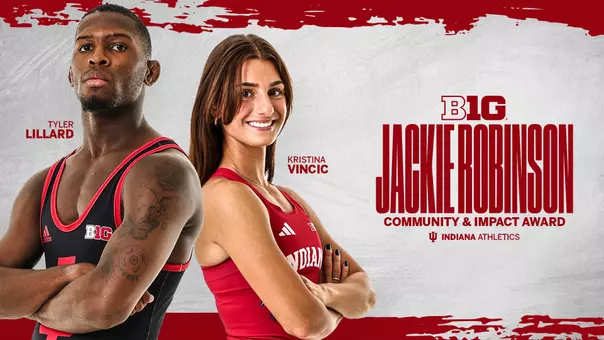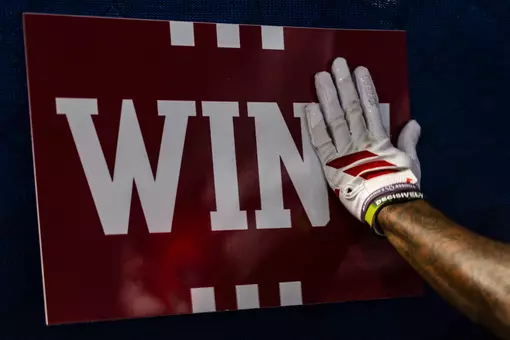Indiana University Athletics

A Veteran, A Dog and Making a Difference
11/6/2022 12:00:00 PM | Football, General
BLOOMINGTON, Ind. - They cheered. Of course, they did. A few cried. Of course, they did. Amid a fierce November wind whipping through Memorial Stadium on an overcast Saturday afternoon, wounded military veteran and service dog bonded and this much was certain:
Love finds a way.
Whether it's between man and dog, or from caring Cream & Crimson faithful appreciative of life-altering sacrifice, Hoosiers make a difference.
Indiana alum Andy Gladstein, his wife Marylynn and their Dogs for Our Brave charity organization certainly do.
John Hayes, a former Marine master sergeant and explosive ordinance disposal technician, and Mia, a silver lab, were officially made a pair in front of thousands of fans attending the Indiana-Penn State football game. They had met several times previously to facilitate training.
"Everyone at IU was fantastic, amazing, supportive, and kind," Hayes says.
Once again, Dogs For Our Brave -- which provides professionally trained service dogs at no cost to veterans who have suffered severe injury or illness -- delivered a key connection.
"It's something that clicks between them," says Gladstein, founder and chairman of the board. "It's wonderful to watch."
The presentation, which came between the first and second quarters, surprised the wheelchair-bound Hayes, who thought he was just coming up from his Florida home for a game as part of a Big Ten-wide salute to the Armed Forces. He was in the north end zone when Mia, who has lived with the family for several months, ran to greet him.
"It was super emotional," Hayes says. "I thought this was for fundraising or to enjoy a game. As soon as they told me, I got teary eyed."
Curt Simic, Indiana University Foundation President Emeritus, director of athletics Scott Dolson and IU Varsity Club development director Anne Crawford set up the presentation.
"This is a great story about IU people doing good things," Simic said. "It shows IU alums trying to make things a little better."
Gladstein reflects that. He is a former IU football player and javelin thrower, and a successful businessman with deep Cream & Crimson philanthropic roots. He and Marylynn are long-time donors to the IU Medical School, the IU Varsity Club, and many other university organizations and causes.
The Gladstein Fieldhouse is named for Gladstein's father, Harry, an IU grad and former track team student manager who became The Washington Post's executive vice president and business manager.
The younger Gladstein has spent an enormous amount of time and money for this cause.
"We have presentations like this all the time," he says, "but they are smaller. This is the first time we're doing it for something major like this. It's always a heartwarming and emotional scene."
*****
In December of 2010, Hayes was on his fourth deployment in Afghanistan. He was on a routine mission when a comrade found an undetonated improvised explosive device. Rushing to help, he stepped on a buried device. It exploded, and he lost both legs and nearly lost his life. He has since undergone more than 60 surgeries.
With a wife and four children, challenges are relentlessly difficult. Mia helps ease the burden.
"Mia can pull me in my wheelchair and save (wear and tear on) my shoulders," Hayes says. "She can find medication when certain alarms go off on my phone. She will hear it, find my medication and bring it to me.
"If I drop my cell phone or keys, she grabs it off the floor instead of me having to bend over and potentially fall. If I do fall out of my chair, she can get help.
"She knows when I'm upset or fearful, when I'm in a good or bad mood. She'll make me put my hand on her and pet her to make me feel better.
"She's been amazing."
That includes Mia's ability to handle shooting-range visits. Hayes, a concealed weapons instructor, goes twice a week. When the shooting starts, she goes to sleep.
"When we saw that," Gladstein says, "it was like, Mia will work."
At IU, kindness followed Hayes everywhere he went, from IU staff to students, who fist-bumped with him while thanking him for his service.
"I don't need thank yous," Hayes says, "but I appreciate it. It means a lot. It helps keep veterans resilient."
Hayes battles PSTD. Mia helps. So does building and flying model airplanes with his father-in-law.
"My mind has a hard time slowing down. It's hard to turn my brain off. That's super therapeutic."
*****
Dogs For Our Brave came from a chance meeting about seven years ago in a Verizon store on California's Coronado Island across from San Diego. Gladstein was wearing an IU hat. A man noticed and the following conversation occurred:
Man: "Are you an IU basketball fan?"
Gladstein: "Yeah."
Man: "Sorry to hear that."
Gladstein: "So you're a Kentucky basketball fan."
Man: "Yeah, how did you know?"
Gladstein: "Because it's one of the great school rivalries in the country."
Eventually, that led to drinks at a Navy Seal bar and the realization that the man was Stephen Bass, a Navy Cross winner for his heroism during a 2001 rescue operation in Northern Afghanistan. At one point, Bass walked through an al-Qaeda and Taliban mine field at the Quala-I-Jangi fortress in Mazar-e-Sharif, advancing nearly a quarter of a mile under heavy enemy fire.
A friendship developed and when Gladstein talked about getting his wife an anniversary present, Bass offered this suggestion:
"Why don't you buy a dog, and have it trained to take care of disabled veterans back from the war on terror?"
Gladstein's response: "That's a great idea. How do I do that?"
Bass said, "I have no idea. You figure it out."
Gladstein did and it was a hit with Marylynn and their friends, who wanted to do something similar for their wives. The result was Dogs For Our Brave.
It started with one trainer working with one dog. They soon hired a head trainer, then six other trainers and other support staff, and built a 4,000-square-foot training center in the St. Louis area that includes state-of-the-art kennels that Gladstein describes as "condos for dogs."
"The patience that it takes to train these dogs is amazing," he says.
****
Dogs For Our Brave pays for all of the dog's expenses, including food and veterinary care.
"No other organization does this," Gladstein says. "There's no burden for the veteran."
Dogs For Our Brave has provided dogs to 22 to 25 veterans, with more coming. Those include five veterans who are wheelchair bound; one who can use prosthetic legs, but with difficulty; several with severe Post Traumatic Stress Disorder; and one who was traumatized by sexual abuse in the military so badly, she didn't leave her house for 11 years.
With a dog, Gladstein says, the woman goes out. The dog's presence provides comfort and security.
"The focus goes to the dog," Gladstein says. "The dog is constantly looking out for the veteran, making sure there's nothing they need."
Training a service dog costs $25,000 and takes 12 to 18 months. There are 104 trainable tasks, although each dog learns just five or six depending on the needs of the veteran they are helping.
For instance, if the veteran is a double amputee confined to a wheelchair, the dog can push or pull the chair, and pick up stuff.
"We have dogs that can pick up a dime," Gladstein says.
There's a command for a dog to get help, so the dog will go to another room, pull on someone's pant leg and guide them to the veteran. There's a command to get a drink. A pull tag is attached to a refrigerator door so the dog can open the door, get a drink, close the door and take the drink to the veteran.
There's a command to turn on or off a light. A command to become stiff and erect so, if a veteran falls, he can use the dog as a cane to get up.
Some veterans have night terrors. If that happens, the dog will jump on the bed, lick the veteran and pull off the covers to stop the nightmares and provide comfort.
"It's amazing the different things a dog can do," Gladstein says.
Dogs For Our Brave uses only rescue dogs. They avoid aggressive breeds.
"You have to be a loving, affectionate, caring dog to be one of our dogs," Gladstein says.
Chemistry is also important. Dog and veteran meet several times to ensure a good match.
"We want to see if there's a bond, if the dog loves the veteran and loves what it's doing," Gladstein said. "Some of these dogs put their heads in the veterans' laps and stare at them. We're like,' OK, we made the connection.'"
With Mia lying by his feet in the Memorial Stadium press box, Hayes vouches for that.
"Dogs Four Our Brave takes what I say into account. They try to get me the best dog."
Mission accomplished.
To donate, go to the website at www.dfob.org and click the red DONATE NOW button.
Love finds a way.
Whether it's between man and dog, or from caring Cream & Crimson faithful appreciative of life-altering sacrifice, Hoosiers make a difference.
Indiana alum Andy Gladstein, his wife Marylynn and their Dogs for Our Brave charity organization certainly do.
John Hayes, a former Marine master sergeant and explosive ordinance disposal technician, and Mia, a silver lab, were officially made a pair in front of thousands of fans attending the Indiana-Penn State football game. They had met several times previously to facilitate training.
"Everyone at IU was fantastic, amazing, supportive, and kind," Hayes says.
Once again, Dogs For Our Brave -- which provides professionally trained service dogs at no cost to veterans who have suffered severe injury or illness -- delivered a key connection.
"It's something that clicks between them," says Gladstein, founder and chairman of the board. "It's wonderful to watch."
The presentation, which came between the first and second quarters, surprised the wheelchair-bound Hayes, who thought he was just coming up from his Florida home for a game as part of a Big Ten-wide salute to the Armed Forces. He was in the north end zone when Mia, who has lived with the family for several months, ran to greet him.
"It was super emotional," Hayes says. "I thought this was for fundraising or to enjoy a game. As soon as they told me, I got teary eyed."
Curt Simic, Indiana University Foundation President Emeritus, director of athletics Scott Dolson and IU Varsity Club development director Anne Crawford set up the presentation.
"This is a great story about IU people doing good things," Simic said. "It shows IU alums trying to make things a little better."
Gladstein reflects that. He is a former IU football player and javelin thrower, and a successful businessman with deep Cream & Crimson philanthropic roots. He and Marylynn are long-time donors to the IU Medical School, the IU Varsity Club, and many other university organizations and causes.
The Gladstein Fieldhouse is named for Gladstein's father, Harry, an IU grad and former track team student manager who became The Washington Post's executive vice president and business manager.
The younger Gladstein has spent an enormous amount of time and money for this cause.
"We have presentations like this all the time," he says, "but they are smaller. This is the first time we're doing it for something major like this. It's always a heartwarming and emotional scene."
*****
In December of 2010, Hayes was on his fourth deployment in Afghanistan. He was on a routine mission when a comrade found an undetonated improvised explosive device. Rushing to help, he stepped on a buried device. It exploded, and he lost both legs and nearly lost his life. He has since undergone more than 60 surgeries.
With a wife and four children, challenges are relentlessly difficult. Mia helps ease the burden.
"Mia can pull me in my wheelchair and save (wear and tear on) my shoulders," Hayes says. "She can find medication when certain alarms go off on my phone. She will hear it, find my medication and bring it to me.
"If I drop my cell phone or keys, she grabs it off the floor instead of me having to bend over and potentially fall. If I do fall out of my chair, she can get help.
"She knows when I'm upset or fearful, when I'm in a good or bad mood. She'll make me put my hand on her and pet her to make me feel better.
"She's been amazing."
That includes Mia's ability to handle shooting-range visits. Hayes, a concealed weapons instructor, goes twice a week. When the shooting starts, she goes to sleep.
"When we saw that," Gladstein says, "it was like, Mia will work."
At IU, kindness followed Hayes everywhere he went, from IU staff to students, who fist-bumped with him while thanking him for his service.
"I don't need thank yous," Hayes says, "but I appreciate it. It means a lot. It helps keep veterans resilient."
Hayes battles PSTD. Mia helps. So does building and flying model airplanes with his father-in-law.
"My mind has a hard time slowing down. It's hard to turn my brain off. That's super therapeutic."
*****
Dogs For Our Brave came from a chance meeting about seven years ago in a Verizon store on California's Coronado Island across from San Diego. Gladstein was wearing an IU hat. A man noticed and the following conversation occurred:
Man: "Are you an IU basketball fan?"
Gladstein: "Yeah."
Man: "Sorry to hear that."
Gladstein: "So you're a Kentucky basketball fan."
Man: "Yeah, how did you know?"
Gladstein: "Because it's one of the great school rivalries in the country."
Eventually, that led to drinks at a Navy Seal bar and the realization that the man was Stephen Bass, a Navy Cross winner for his heroism during a 2001 rescue operation in Northern Afghanistan. At one point, Bass walked through an al-Qaeda and Taliban mine field at the Quala-I-Jangi fortress in Mazar-e-Sharif, advancing nearly a quarter of a mile under heavy enemy fire.
A friendship developed and when Gladstein talked about getting his wife an anniversary present, Bass offered this suggestion:
"Why don't you buy a dog, and have it trained to take care of disabled veterans back from the war on terror?"
Gladstein's response: "That's a great idea. How do I do that?"
Bass said, "I have no idea. You figure it out."
Gladstein did and it was a hit with Marylynn and their friends, who wanted to do something similar for their wives. The result was Dogs For Our Brave.
It started with one trainer working with one dog. They soon hired a head trainer, then six other trainers and other support staff, and built a 4,000-square-foot training center in the St. Louis area that includes state-of-the-art kennels that Gladstein describes as "condos for dogs."
"The patience that it takes to train these dogs is amazing," he says.
****
Dogs For Our Brave pays for all of the dog's expenses, including food and veterinary care.
"No other organization does this," Gladstein says. "There's no burden for the veteran."
Dogs For Our Brave has provided dogs to 22 to 25 veterans, with more coming. Those include five veterans who are wheelchair bound; one who can use prosthetic legs, but with difficulty; several with severe Post Traumatic Stress Disorder; and one who was traumatized by sexual abuse in the military so badly, she didn't leave her house for 11 years.
With a dog, Gladstein says, the woman goes out. The dog's presence provides comfort and security.
"The focus goes to the dog," Gladstein says. "The dog is constantly looking out for the veteran, making sure there's nothing they need."
Training a service dog costs $25,000 and takes 12 to 18 months. There are 104 trainable tasks, although each dog learns just five or six depending on the needs of the veteran they are helping.
For instance, if the veteran is a double amputee confined to a wheelchair, the dog can push or pull the chair, and pick up stuff.
"We have dogs that can pick up a dime," Gladstein says.
There's a command for a dog to get help, so the dog will go to another room, pull on someone's pant leg and guide them to the veteran. There's a command to get a drink. A pull tag is attached to a refrigerator door so the dog can open the door, get a drink, close the door and take the drink to the veteran.
There's a command to turn on or off a light. A command to become stiff and erect so, if a veteran falls, he can use the dog as a cane to get up.
Some veterans have night terrors. If that happens, the dog will jump on the bed, lick the veteran and pull off the covers to stop the nightmares and provide comfort.
"It's amazing the different things a dog can do," Gladstein says.
Dogs For Our Brave uses only rescue dogs. They avoid aggressive breeds.
"You have to be a loving, affectionate, caring dog to be one of our dogs," Gladstein says.
Chemistry is also important. Dog and veteran meet several times to ensure a good match.
"We want to see if there's a bond, if the dog loves the veteran and loves what it's doing," Gladstein said. "Some of these dogs put their heads in the veterans' laps and stare at them. We're like,' OK, we made the connection.'"
With Mia lying by his feet in the Memorial Stadium press box, Hayes vouches for that.
"Dogs Four Our Brave takes what I say into account. They try to get me the best dog."
Mission accomplished.
To donate, go to the website at www.dfob.org and click the red DONATE NOW button.
Darian DeVries Postgame Press Conference
Friday, November 21
IUBB Postgame Press Conference
Friday, November 21
IUWBB Postgame Press Conference vs. Butler - Teri Moren
Thursday, November 20
IUWBB Postgame vs. Butler - Players
Thursday, November 20




